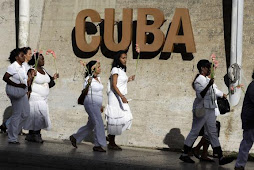Dissidents feel betrayed, abandoned
BY FRANK CALZON CUBACENTER.ORG
12/18/2014 7:01 PM 12/18/2014 7:01 PM
Americans rejoice that an American hostage has been freed from a Cuban
prison. For five years, Raúl Castro bartered Alan Gross for the release
of Cubans convicted of spying on U.S. military bases. In the end,
President Obama struck the deal that he expects will reset U.S.-Cuba
relations. Soon negotiations will start with Havana, but much of what
the regime wanted has already been given by Washington, without getting
anything in return.
Cuba's dissidents on the island feel betrayed and abandoned by Obama,
just like the Syrians who witnessed the killing of thousands of men,
women and children after the president promised to act if Bashar Assad
crossed Obama's "red line."
In fact, the first casualty of Obama's Cuba policy was the cancellation
by Raúl Castro of the Jan. 8, 2015 talks on human rights with the
European Union that were to be conducted in Havana. Now that the new
U.S. policy will bring untold millions to Castro's coffers, Castro
probably feels that if Venezuela's subsidies, indispensable until now,
are diminished he could count on American tourists to help him get along.
Gen. Castro, who has been wearing civilian clothes for awhile, was
suddenly wearing his military uniform in a Cuban TV broadcast this week.
He said that Obama's concessions were not enough, and his controlled
media have yet to publish in full the U.S. president's Cuba speech.
Gross' situation in no way mirrored that of the released Cuban spies. He
committed no crime recognized by international law: He gave a small
Cuban Jewish group a laptop computer and a satellite telephone to
connect to the Internet. Held on trumped-up charges, he was sentenced to
15 years in prison. Two years ago, a U.N. report described the trial as
unfair and arbitrary and urged Raúl Castro to set him free without delay.
Cuba's political trials are unfair, arbitrary and lack the most basic
procedural safeguards. Tens of thousands of Cubans have been sentenced
to long prison terms for disagreeing with the regime in such kangaroo
courts. Havana does not allow the International Committee of the Red
Cross to visit such prisons.
By contrast, the Cuban spies were publicly tried in U.S. courts and
provided lawyers; Cuban military officers were allowed to testify on
their behalf. They were convicted of spying on the U.S. military and
providing information that led to the murder of four Miami civilians
flying two, single-engine Cessnas searching for refugees; the planes
were shot down over international waters in the Florida Straits by Cuban
MiGs.
After the Cuban spies were convicted, one was furloughed to return to
Cuba to see a sick relative; it was a privilege Castro denied Gross when
Gross' mother was dying.
The regime grabbed Alan Gross not for anything he did, but specifically
to use him as a hostage to extort concessions from Washington.
Earlier on, Havana shocked the world by jailing 75 dissidents. Amnesty
International declared them to be "prisoners of conscience." Raúl
offered to release them if Washington released the Cuban spies. The
imprisoned dissidents denounced the exchange declaring they were "not
spies" but innocent patriots, and unwilling to be part of the extortion.
They remained in prison for years until Castro banished them and their
families to Spain, denying them any right to return, a violation of the
Universal Declaration of Human Rights.
Now some will say the release of Gross shows significant change in Cuba.
Yet two years ago, the regime was caught smuggling war materials to
North Korea in violation of U.N. sanctions. In Venezuela, Cuban security
officers are actively engaged in repressing political opposition.
Recently, a Cuban American was convicted of a $300-million Medicare
fraud in which the money was deposited in Cuba's National Bank.
Now that Alan Gross is home, the question is, What comes next? One thing
is certain: blackmail and extortion don't establish a tenable platform
on which to rebuild United States-Cuba relations.
FRANK CALZON IS EXECUTIVE DIRECTOR OF THE CENTER FOR A FREE CUBA.
Source: Dissidents feel betrayed, abandoned | The Miami Herald -
http://www.miamiherald.com/opinion/op-ed/article4644840.html
Subscribe to:
Post Comments (Atom)





No comments:
Post a Comment